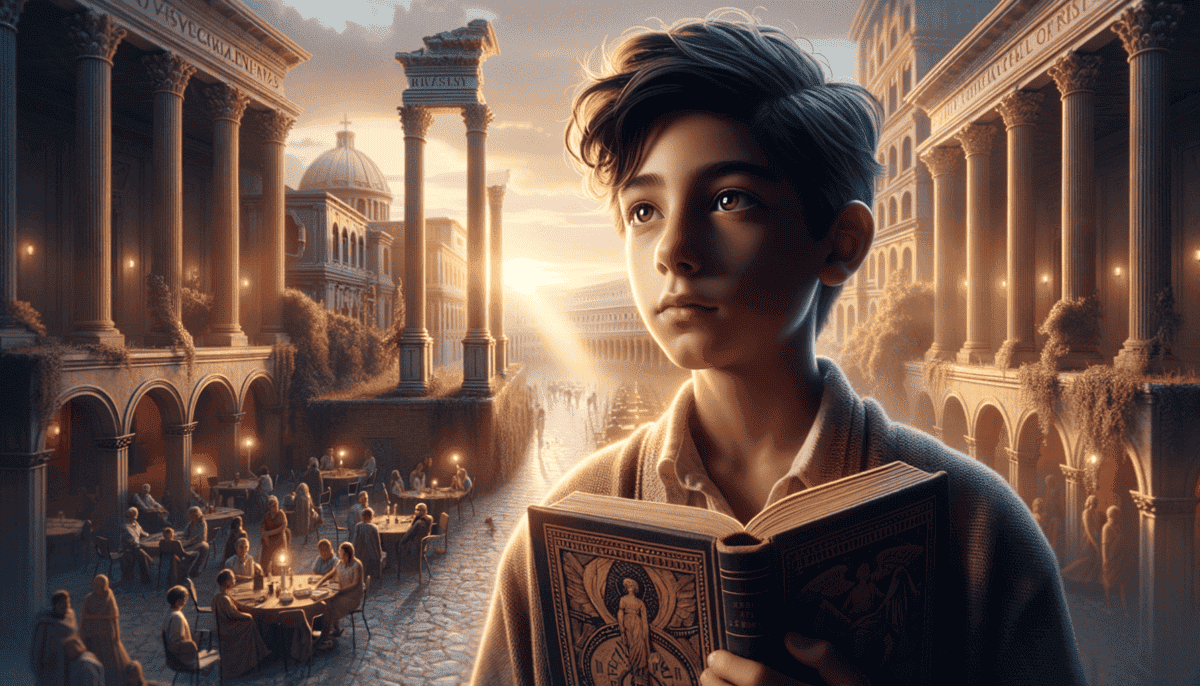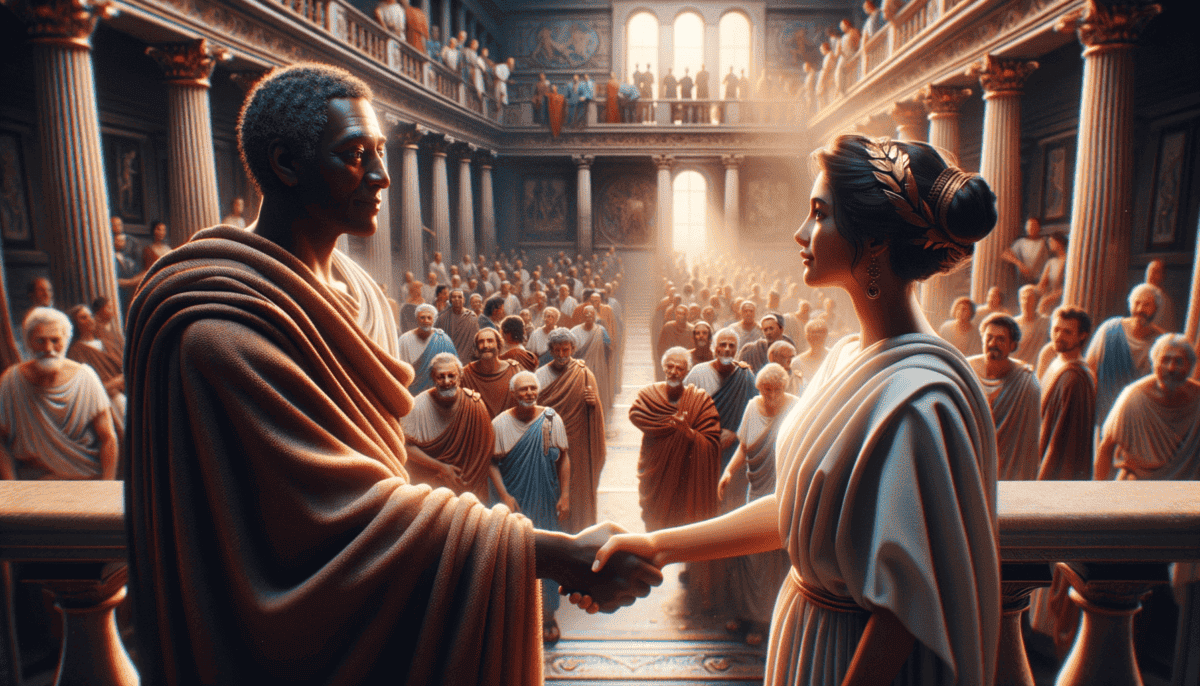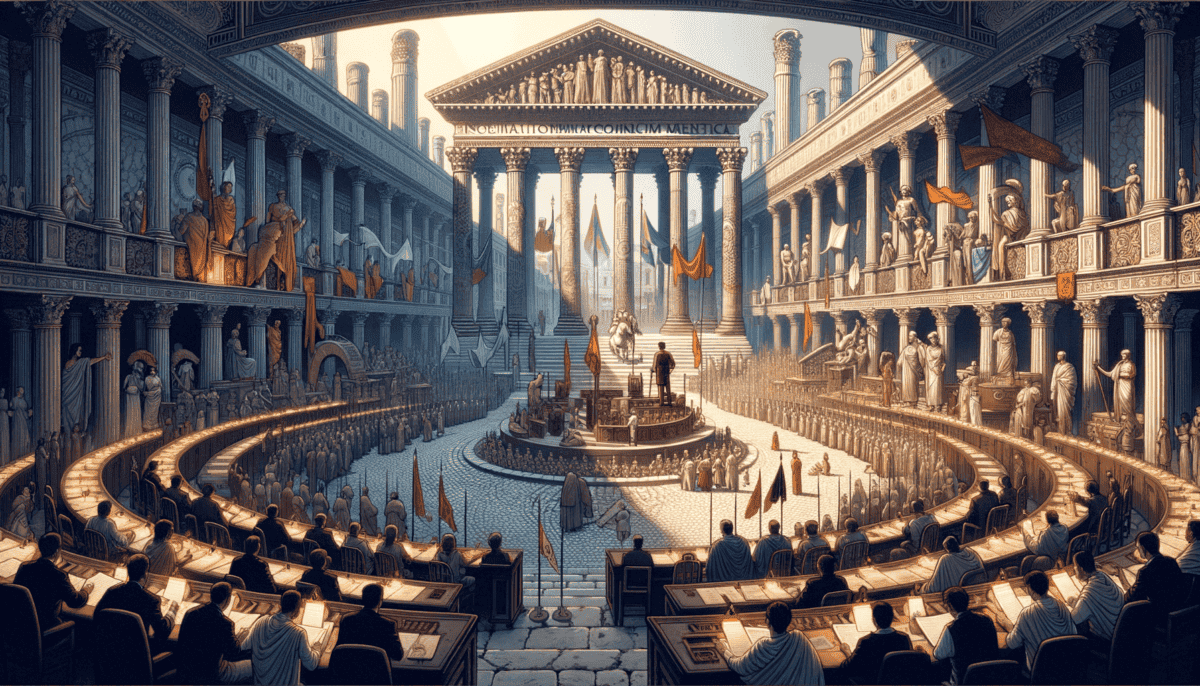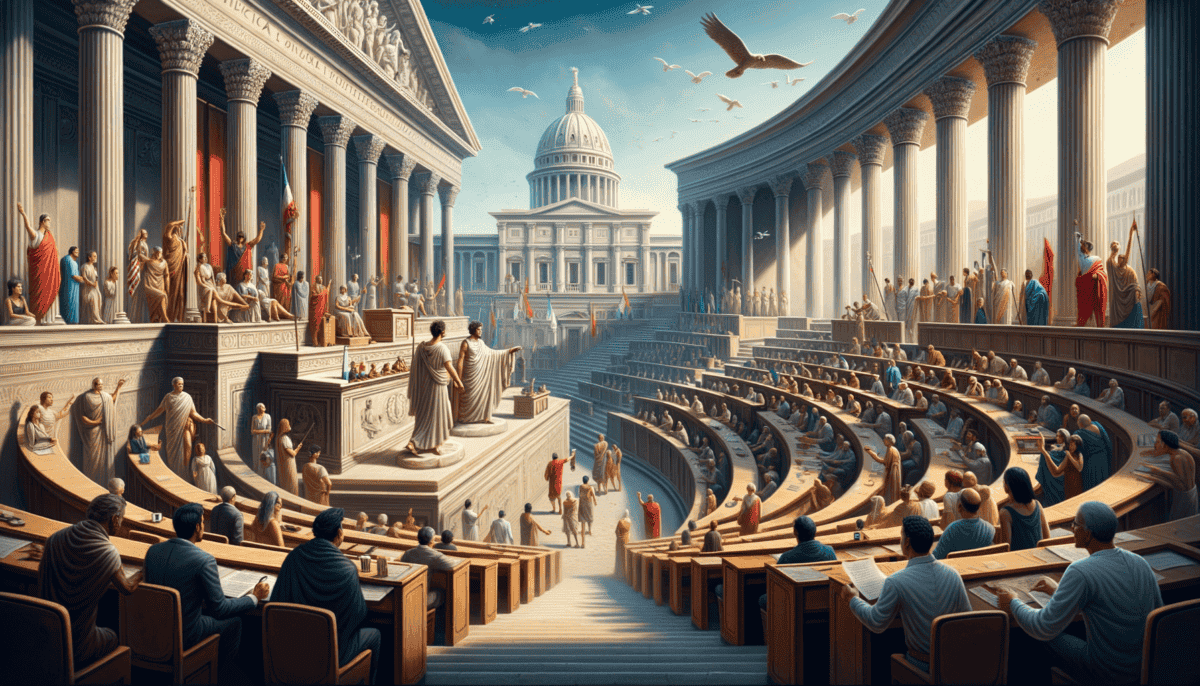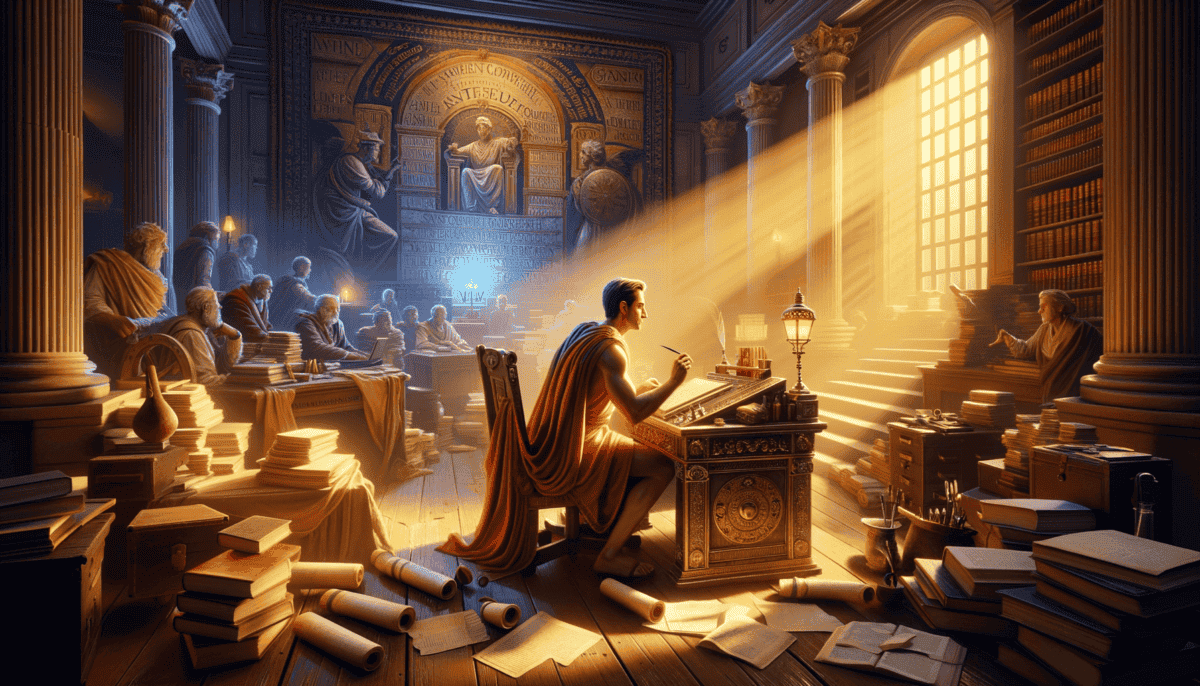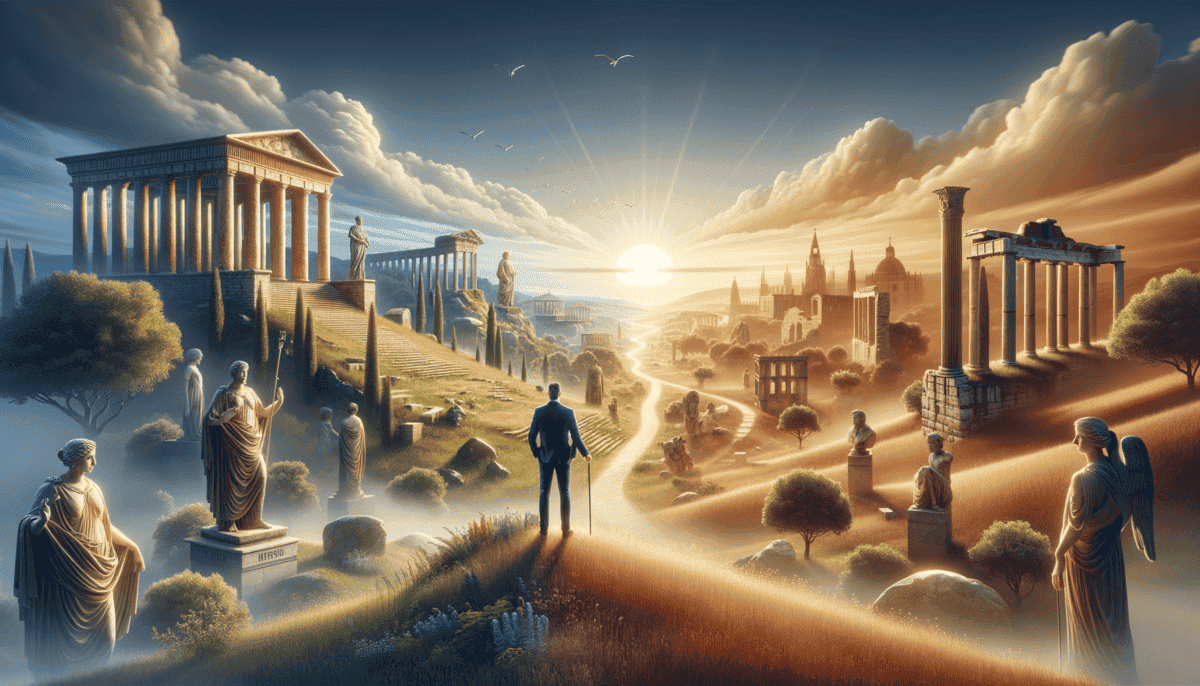The Seeds of Democracy
Marco drummed his fingers on his desk, staring at the history homework in front of him. "Why do we have to learn about ancient Rome?" he muttered. The classroom walls were covered with colorful maps showing the vast Roman Empire, but none of it made sense to him.
Mrs. Rodriguez noticed his frustration. "Marco, did you know that many things we do in America today came from ancient Rome?"
Marco's eyes widened. "Really? Like what?"
"Well," she smiled, walking over to his desk, "when you raised your hand to ask a question earlier – that's just like how Roman citizens would vote. They would raise their hands in big meetings called assemblies."
The whole class turned to listen as Mrs. Rodriguez pulled up a chair. "The Romans gave us some very important ideas about government. They believed that citizens should have a say in who leads them and what laws are made."
"Just like we do!" shouted Sarah from across the room.
Marco sat up straighter. "But how did they do it without computers and phones?"
Mrs. Rodriguez laughed. "They met in person – in a beautiful building called the Forum. Imagine a place bigger than our school gymnasium, where hundreds of people would gather to discuss important things like laws and wars."
She drew a simple diagram on the board:
| Roman Government | Our Government Today |
|---|---|
| Senate | Congress |
| Consuls | President |
| Citizens vote | Citizens vote |
"The Romans believed in something very important," Mrs. Rodriguez continued. "They thought that no one person should have too much power. That's why they had two leaders called consuls instead of just one king."
Marco's eyes lit up. "Like how we have different branches of government?"
"Exactly!" Mrs. Rodriguez beamed. "The Romans were very clever. They knew that sharing power was safer than giving it all to one person."
"That's a great question," Mrs. Rodriguez replied. "The Romans had special meetings where people could debate and discuss their ideas. Sometimes these debates would last for days!"
The bell rang, but for once, Marco didn't rush to pack up his things. He looked at the homework assignment with new interest. The ancient Romans didn't seem so boring anymore. In fact, they were starting to sound pretty amazing.
As he walked home that afternoon, Marco noticed things he'd never paid attention to before. The courthouse downtown looked a lot like the Roman buildings in his textbook. Even the words carved above the door – "Justice For All" – reminded him of what Mrs. Rodriguez said about Roman laws.
That night, as Marco started his homework, he couldn't help but smile. Maybe learning about ancient Rome wasn't just about memorizing old dates and names. Maybe it was about understanding where our own ideas about fairness and democracy came from.
He opened his notebook and began to write: "Dear Diary, Today I learned something cool. Our government isn't just American – it's partly Roman too! And it all started with people raising their hands…" ✍️
The Republic Rises
Marco couldn’t wait to get back to school the next day. As he rushed into the museum where his class was taking a field trip, he bumped into an older man wearing a name tag that read “Dr. Felix, Museum Historian.”
“Whoa there, young citizen!” Dr. Felix smiled warmly. “You seem excited about history!”
“Yes! We’re learning about ancient Rome!” Marco replied. “Yesterday I found out they gave us lots of ideas about government.”
Dr. Felix’s eyes twinkled. “Would you like to see something magical?” He pulled out what looked like an old golden coin. “This is from the Roman Republic. It’s over 2,000 years old!”
“The Republic?” Marco asked. “What’s that?”
“Ah!” Dr. Felix led Marco to a large model of ancient Rome. “The Republic was when Rome had its most amazing system of government. Instead of a king telling everyone what to do, they had a group of people making decisions together.”
“Like our Congress?” Marco asked.
“Exactly! The Roman Senate was like our Congress. But here’s something cool – they had special helpers called tribunes who could shout ‘VETO!’ when they didn’t like a law.”
Marco giggled. “Veto? We still use that word!”
| Roman Words We Use | What They Mean |
|---|---|
| Veto | “I forbid!” |
| Senate | Wise elders |
| Republic | Public matter |
Dr. Felix showed Marco a statue of a man in a toga. “This is Cicero. He was one of Rome’s greatest speakers. He believed that laws should be fair for everyone.”
As they walked through the museum, Dr. Felix told Marco about how Roman citizens would gather in a big open space called the Forum. “It was like a giant town hall meeting!” he explained. “People would come from all over to vote and share ideas.”
“But did everyone get to vote?” Marco asked.
“That’s a very smart question,” Dr. Felix replied. “At first, only rich men could vote. But over time, more people fought for their right to have a say.”
Marco thought about this. “Just like in our country – more people can vote now than could before!”
“You’re catching on quick!” Dr. Felix beamed. “The Romans taught us that a government works best when people participate.”
As the day went on, Dr. Felix showed Marco ancient scrolls, pottery, and coins that told the story of Rome’s government. Each piece was like a clue to understanding how our own government works today.
Before leaving, Dr. Felix gave Marco a special replica coin. “Remember,” he said, “every time you see someone voting or speaking up at a meeting, you’re seeing a little bit of Rome’s gift to us.”
That evening, Marco held his new coin and imagined the voices of Roman citizens echoing through time, helping to shape the way we make decisions today.
Power and Struggle
Marco spun his replica Roman coin on his desk, watching it twirl. Dr. Felix’s words about voting rights stuck in his mind. As the coin fell flat, Marco noticed two different faces on it.
“What’s troubling you, Marco?” Dr. Felix appeared in the doorway of the classroom.
“These two faces on the coin look angry at each other,” Marco said. “Why?”
Dr. Felix pulled up a chair. “Those faces tell an important story about power and fairness in Rome. You see, there were two main groups: the patricians and the plebeians.”
“That doesn’t sound very fair,” Marco frowned.
“It wasn’t!” Dr. Felix agreed. “And the plebeians didn’t like it one bit. Want to see what they did about it?”
Dr. Felix pulled out a magical scroll. As he unrolled it, images danced in the air showing ancient Rome. “One day, all the plebeians just walked out of Rome!”
| What Plebeians Wanted | What They Got |
|---|---|
| Written Laws | The Twelve Tables |
| Their Own Leaders | Tribunes |
| Fair Treatment | New Rights |
“They just left?” Marco’s eyes widened.
“Yes! They said, ‘If we can’t help make the rules, we won’t help Rome at all!’ It was like a big strike.”
Marco watched as the magical images showed the patricians panicking. “What happened next?”
“The patricians realized they needed the plebeians. Rome couldn’t work without everyone helping. So they made changes.”
“Like what?” Marco leaned forward.
“They wrote down all the laws so everyone could see them. They let plebeians pick their own leaders called tribunes. These tribunes could say ‘NO!’ to unfair laws.”
Dr. Felix drew a simple balance scale on the board. ⚖️ “This is what we call ‘checks and balances.’ When one group has too much power, another group can check them.”
“Like in our government!” Marco exclaimed. “The president can’t just do whatever they want!”
“Exactly! And guess what? The plebeians didn’t stop there. Over many years, they earned more rights. Some even became leaders themselves!”
Marco looked at his coin again. “So these faces… they’re not angry anymore?”
“Look closer,” Dr. Felix smiled. “They’re facing each other, talking. When people work together and share power, everyone wins.”
That afternoon, Marco’s class played a game. Half were patricians, half plebeians. They had to make rules that everyone thought were fair.
“Remember,” Marco told his classmates, “we need everyone to help make our classroom work!”
As they worked together, Marco understood something important: making things fair isn’t always easy, but it’s worth the effort. When everyone has a voice, good things happen. ️
The coin in his pocket felt warmer now. Those two faces weren’t enemies anymore – they were partners in making Rome stronger.
The Empire Transforms
Marco sat at his desk, staring at a new image Dr. Felix had shown the class – a golden laurel crown.
“What happened to all those fair rules we learned about?” Marco asked, puzzled. “Did Rome forget about sharing power?”
Dr. Felix smiled mysteriously and pulled out his magical scroll. “Watch this, Marco. Rome was about to change in a big way.”
The scroll glowed, and suddenly the classroom walls transformed into the streets of ancient Rome. People rushed around looking worried.
“Meet Julius Caesar,” Dr. Felix pointed to a tall figure in a red cape. “He thought Rome needed one strong leader instead of many senators.”
“But why?” Marco watched as the figure walked through the crowded streets.
“Rome had grown very big. The old way of running things wasn’t working well anymore. Too many leaders were fighting instead of helping people.”
| Republic Problems | Empire Solutions |
|---|---|
| Too much arguing | One main leader |
| Slow decisions | Faster changes |
| Many different rules | Same rules everywhere |
“Look what happens next,” Dr. Felix waved his hand, and the scene changed. The magical images showed Caesar crossing a river with his army.
Marco watched as Rome changed. “But did people like having just one ruler?”
“Some did, some didn’t,” Dr. Felix explained. “The first emperor, Augustus, was very clever. He kept some old Republic ideas while making new ones work better.”
“How did he do that?” Marco asked.
“He let the Senate keep meeting, but he had the final say. He made sure roads were built, cities were safe, and people had food. Many called it the ‘Roman Peace.’ ✌️”
The magical scenes showed busy ports, new buildings, and happy people. “Wow!” Marco exclaimed. “It looks better!”
“Yes, but remember – having one person in charge can be tricky. What if they make bad choices?”
Marco thought about this. “Like when Tommy tried to be the only one choosing games at recess?”
“Exactly!” Dr. Felix laughed. “That’s why today, most countries try to mix good ideas from both systems.”
The classroom walls returned to normal, but Marco’s mind was full of new thoughts. He drew two columns in his notebook:
Empire: Gets things done faster ✔️
“So that’s why our government today has a president AND Congress?” Marco asked brightly.
“Now you’re thinking like a historian!” Dr. Felix beamed. “We learned from Rome that we need both – strong leadership and people’s voices.”
As the class ended, Marco looked at his drawing of the laurel crown. He added something new – a small group of hands holding it up together.
“Every government needs balance,” he whispered to himself, “just like riding a bike!”
Outside the window, the afternoon sun made shadows that looked like Roman columns on the playground. Marco wondered what other secrets from the past were waiting to be discovered.
Laws and Legacy
The morning sun streamed through the classroom windows as Marco bounced excitedly in his seat. Today, Dr. Felix had promised to show them something special about Roman laws.
“Who knows what a law is?” Dr. Felix asked, holding up his magical scroll.
Marco’s hand shot up. “It’s like rules that everyone needs to follow!”
“Right! And guess what? Many of our rules today come from ancient Rome.” Dr. Felix unrolled his scroll, and the classroom walls melted away.
They found themselves standing in a Roman courtroom. A judge wore a white toga with a purple stripe.
“Look familiar?” Dr. Felix asked. “Our judges still wear special robes today!”
| Roman Laws We Still Use | What They Mean |
|---|---|
| Innocent until proven guilty | You’re not in trouble until they prove it |
| Right to defend yourself | You can tell your side of the story |
| Making contracts | Keeping promises we write down |
“But wait,” Marco watched two people shaking hands in agreement, “did they have lawyers like we do?”
“They sure did!” Dr. Felix pointed to a man helping someone explain their case. “They called them ‘advocatus’ – someone who speaks for you.” ⚖️
The scene changed to show children playing in a Roman street. A boy had broken his friend’s toy.
“What happens now?” Marco asked.
“Watch,” Dr. Felix smiled. The children went to a grown-up who helped them solve their problem fairly.
“That’s just like when Ms. Johnson helps us fix playground problems!” Marco realized.
“Exactly! Good laws help people get along and solve problems fairly.”
• Everyone should be treated fairly
• Listen to both sides of a story
• Write down important promises
• Help people solve problems peacefully
Marco watched as the magical scenes showed more examples. People buying houses, making business deals, and solving problems without fighting.
“The Romans were super smart!” Marco exclaimed. “They figured out how to make rules that worked for everybody.”
“And we still use their ideas,” Dr. Felix added. “Every time you make a promise, follow a school rule, or solve a problem fairly – you’re using Roman ideas!”
The classroom slowly returned to normal. Marco looked at his classmates differently now. They were all part of this long story of laws and fairness.
“Dr. Felix,” Marco asked thoughtfully, “are we kind of like modern Romans when we follow good rules?”
“We sure are! And remember – good laws help everyone live better together.” ⚖️
Marco doodled a small set of scales in his notebook. Under it, he wrote: “Fair rules = Happy people!”
As the bell rang, Marco felt proud. He was part of something big – a story that started long ago and was still going strong today.
Democracy’s Continuing Journey
The school year was ending, and Marco couldn’t stop thinking about everything he’d learned about Rome. Today was special – they would have their final adventure with Dr. Felix.
“Ready for one last journey?” Dr. Felix asked, holding up his magical scroll.
“Yes!” the class shouted together.
The scroll glowed, and suddenly they were floating above the Earth. Below them, lights connected different countries like a giant sparkly web.
“Each light shows a place using ideas from ancient Rome,” Dr. Felix explained. “Look how many there are!”
They zoomed down to visit different places:
• The United States Congress
• British Parliament
• European Union meetings
• School student councils
“Hey, that looks like our school!” Marco pointed to a building where kids were having a class election.
“That’s right! Even school elections come from Roman ideas about voting,” Dr. Felix smiled. ️
| Roman Gift | How We Use It Now |
|---|---|
| Voting | Choosing our leaders |
| Making Laws | Creating fair rules |
| Working Together | Solving problems as a team |
“But Dr. Felix,” Marco asked, “what can kids like us do to help?”
“That’s a wonderful question! Let me show you something special.”
The scene changed to show children from all over the world:
“You can join school councils, help make classroom rules, be fair with friends, and learn about how government works. Every small action helps democracy grow stronger!”
Marco’s eyes lit up. “So we don’t have to wait until we’re grown-ups to make a difference?”
“Not at all! You’re already part of democracy’s story.”
Back in the classroom, Marco looked at his classmates with new eyes. They weren’t just kids – they were future leaders, voters, and citizens.
“Before we say goodbye,” Dr. Felix said, “what’s the most important thing you learned about Rome?”
Marco thought for a moment. “That working together and being fair helps everyone!”
“And that good ideas last forever!” added Sarah.
“That we can all help make things better!” Tommy chimed in.
Dr. Felix beamed with pride. “You’ve all learned so much. Remember, the story of democracy isn’t over – it’s still being written, and you’re all part of it!”
As the final bell rang, Marco gave Dr. Felix a big hug. “Thank you for showing us all this amazing stuff!”
Walking home, Marco saw his town differently. The voting signs, the courthouse, the town hall – they were all pieces of a story that started in Rome and continued through him.
He took out his notebook and wrote: “Democracy isn’t just history – it’s our story too! And we all help write it!” ✨
Looking up at the sky, Marco smiled. He couldn’t wait to start his own chapter in democracy’s big adventure.

